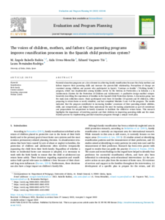Parental education programs are a key element in achieving family reunification because they help mothers and fathers improve their parenting skills and increase the parent-child relationship. Perceptions of change are examined among children and parents who participated in Spain’s “Caminar en familia” (“Walking family”) program, which was implemented among families served by the Sistema de Protección a la Infancia y a la Adolescencia (System for the Protection of Children and Adolescents).
A qualitative design enabled comprehensively describing the experiences of families in the Spanish Child Protection System. A discussion group was the main data collection source. Study participants were from 16 families (23 parents and 20 children), either preparing to return home or newly reunified, and had completed Modules 3 and 4 of the program. The results indicated that the program contributed to increasing families’ awareness of their parenting-related abilities, skills, and competencies, and helped them understand the need for making adjustments as part of coexistence and preparations for adaptations in family dynamics to facilitate the children’s return home.
This research highlights the importance of involving parents and their children in improving parenting skills and the reunification process by implementing parental education programs through a unique work plan.

